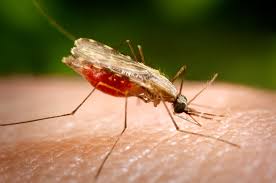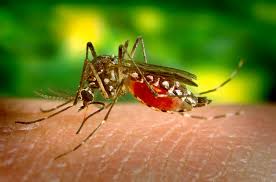
Anopheles albimanus
It may surprise you to know that mosquitos have sex lives as well. We asked entomologist Dr Frank Avila from the University of Antioquia in Medellin, why the sexual agendas of mosquitos are at odds with each other and the role of seminal fluid proteins in the struggle between the sexes.
If you ask Dr Frank Avila how mosquitos make love, he’ll get straight to the point. ‘Mating happens really quickly.’ Avila told us, adding perversely that ‘[w]e’ve observed mating in the lab. Males and females will fly together and they have to get in pretty close proximity and the female may accept him really quickly or just fly away.’ In other words, the whole encounter happens mid-flight and is over within seconds.
However, this mosquito-voyeurism doesn’t just end with the researchers at the University of Antioquia watching; they’re listening in too. The team are currently listening to the pre-mating behaviours in Anopheles albimanus (a major malaria vector in South America) by recording the frequencies of their wingbeats. ‘We know that the wingbeat of mosquitos gives off a frequency.’ Avila said. The frequency is distinct by species and the researchers believe that the mosquitos are able to discriminate between these frequencies (and possibly other cues) so that females and males can recognise each other. The researchers can, with great difficulty, record the entire foreplay and then use a program to break down the audio into its series of harmonics. ‘And when you break down these frequencies to a series of harmonics, the male can actually modulate a specific harmonic to match that of the female. The hypothesis is that the male modulation of frequency is required for mating to ensue.’ These frequencies can also be used by females to determine how large the males are as larger males have larger, well, frequencies. Because even in the microscopic world of insects, size matters.
What’s truly remarkable, however, about the sex lives of mosquitos is how much the males are at odds with the females. And in the war between the sexes, the male mosquitos are winning. Avila’s team, which is connected with the Max Planck institute in Germany, wants to know why and he shared with us the research from the most recent paper that he co-authored as to why male mosquitos might have a leg up on the females.

Aedes aegypti
According to Avila, a conflict between males and females exists because of different sexual agendas. ‘The male wants the female only to mate with him and his seminal fluid proteins pretty much assure that because it prevents her from mating with other males so effectively that they’re mated for life. The female on the other hand wants to mate with more than one individual to increase the genetic diversity of her offspring so that they have a better chance of survival.’ Thus, the male desire for faithfulness and the female urge to play the field appear at odds with one another.
But the male mosquito has one crucial weapon in his arsenal: the proteins found in his seminal fluid that slowly take their chemical hold over the female. The proteins that are found in the seminal fluid of mosquitos are absolutely vital for sperm to function properly and are usually produced in the accessory glands, which are reproductive glands that are poorly described in the female but well-researched on the male side.
The effect of these proteins on female mosquitos is not dissimilar to Puck’s potion in A Midsummer Night’s Dream where all suitors are warded off in the blind loyalty to the one she has already mated with. A typical rejection involves the female trying to get away from other males as best she can (and trying not to land so the new suitor won’t be able to mate with her). What the experts think is most likely happening is that the female is getting an unknown protein from the male through his seminal fluid and it changes her behaviour and the way she interacts with potential suitors. ‘She rejects future mating opportunities. Aedes aegypti females, once they’ve mated, are unlikely to mate again in their lifetime.’ Avila told us, referring to the species in South America that is known to be a vector for zika, dengue and yellow fever. ‘We don’t know what that protein is in mosquitos at all but we’re trying to find out.’
But mating not only does a number on the female’s sexual appetite, it affects her actual appetite as well by triggering her to blood feed. ‘This is down to the effect of the proteins.’ Avila said, going on to explain that ‘[t]he researchers are almost certain of this because when they dissected the accessory glands and purified the proteins and injected it into the female, the female acted as if she had mated even if she had not. She’ll have a blood meal, she won’t ever mate again and she’ll lay the eggs which obviously won’t hatch because there was no sperm.’
The proteins also change crucial aspects of the female mosquito from within. Insect females (like fruit flies, for example) take their own sweet time in producing eggs but, on the other hand, female mosquitos will put egg-production into overdrive. ‘Once she’s inseminated, she’ll ramp that up which is usually a signal from a seminal fluid protein.’ Avila said. But in mosquitos, the signal appears to be a blood meal which is related to mating because she won’t usually take a blood meal unless she’s mated.’ In the lab they have actually starved them and then subsequently fed them to show how the blood meal helps them develop eggs, independently of any males inseminating them.
Avila qualifies many of his comments by noting that the experiments they run function primarily on lab mosquitos and may not necessarily transfer to mosquitos in the wild. He also noted that the female mosquito is still very much a mystery when compared with the male (which has been studied extensively). ‘Females actually secrete similar kinds of proteins to seminal fluid proteins but we don’t really know what they’re doing and what their function is. This has only been studied within fruit flies over the last 5 years so it will take some time but there appears to be an attempt to assert control from both male and female.’
But despite these caveats, the research that Avila and his team are doing have important implications for human reproduction, as sperm storage is critical and similar in both humans and insects. ‘Seminal fluid proteins direct how sperm gets stored. If we can understand the connection between the protein’s effect on sperm in insects, the hope is that we can also do so in the case of humans.’ he said.
There are also important consequences that the research may have on the study of tropical diseases and how to help alleviate its dissemination. ‘We know that there are at least 90-100 of these proteins in Aedes aegypti. In Aedes albopictus there’s 200 of them. Several are rapidly evolving and what this means is that they’re likely to be important and if we know how they function, we can use this knowledge to suppress fertility. And if they’re rapidly evolving, we’re only going to be affecting a single species or a group of closely related species. So we can develop inhibitors that are specific to the actual insect that we’re trying to control.’
So Avila, who moved to Medellin from Hawaii to be with his own mate, has his work cut out for him and his team in trying to solve some of the more perplexing questions about the sexual lives of mosquitos but, despite still struggling with Spanish, he couldn’t ask for more with his great lab in Antioquia and dedicated students to help him out.
Meanwhile, the next time you’ve been bitten by a mosquito on the Colombian coast, spare a thought for the tragic fate of the poor female as she’s not entirely herself. What’s bugging her might just be coming from within.





